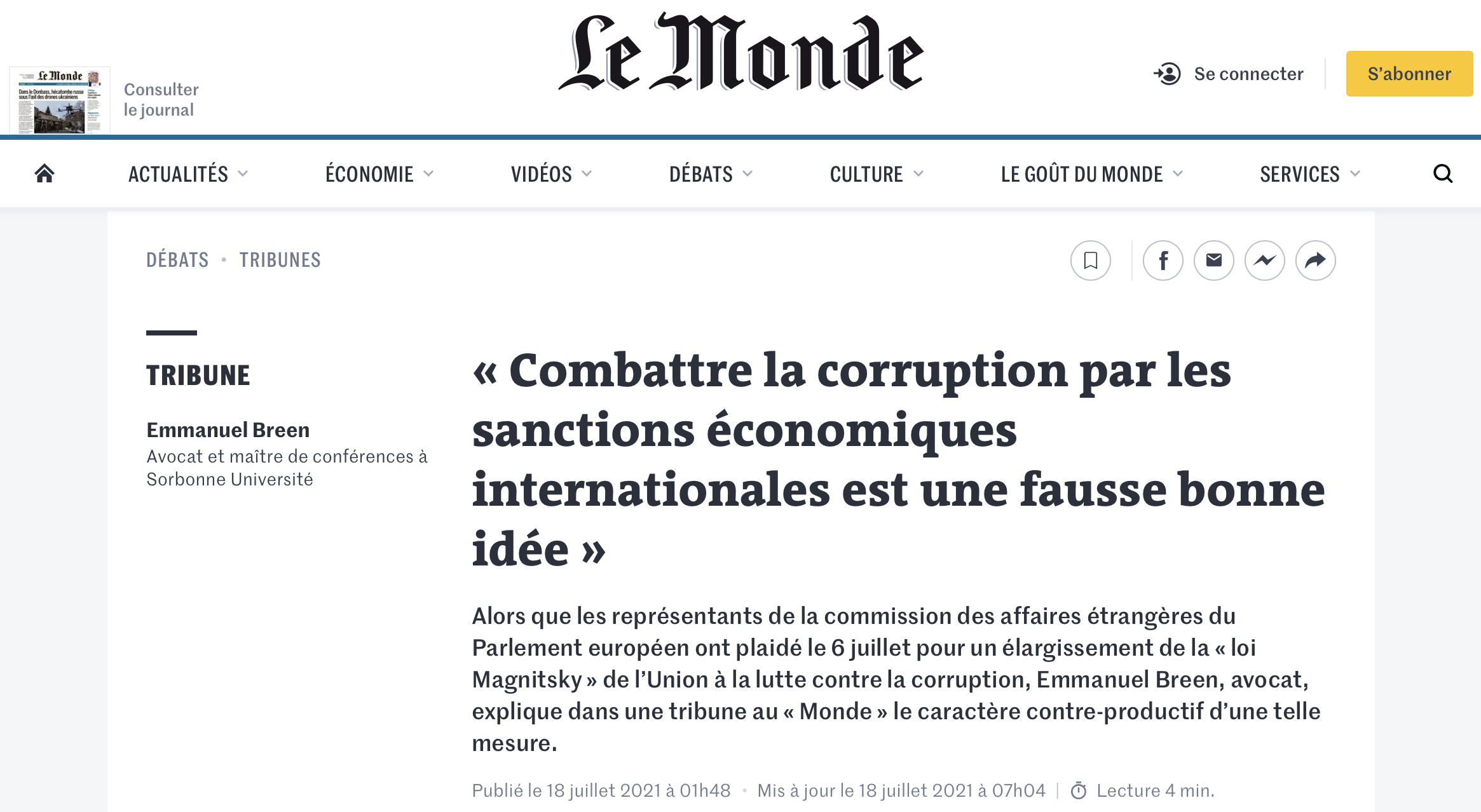On July 6th, the European Parliament’s Committee on Foreign Affairs opened a debate on the “European Union Global Human Rights Sanctions Regime (the European Magnitsky Act)” during European Parliament’s plenary session. On that occasion the representatives of the Committee argued in favor of broadening this regime to include the fight against corruption.
What is the issue at hand?
States have the power to impose economic retorsion measures on each other in response to violations of international law or of their essential interests. In addition to such embargos, which are reprisals between states, there are measures which target specifically-designated individuals, such as visa refusals, asset freezing, and trade bans. These graduated economic sanctions, which are at the disposal of political powers, offer a number of alternatives to war, at times of international tensions.
Might such sanctions be imposed to respond to serious violations of human rights? The United States Congress was the first to answer in the affirmative, when it passed the “Magnitsky Act” in 2012, named after Sergei Magnitsky, a Russian lawyer who died in detention after having investigated a tax fraud matter that was potentially embarrassing for certain Russian officials. The law initially targeted Russia only. But its scope was extended in 2016, and the United States has since then been able to impose economic sanctions in the name of human rights, not only against Russian nationals but against any person anywhere in the world: what is now referred to as the “Global Magnitsky Act.”
In December of 2020, the Council of the European Union equipped itself with a similar tool aimed at the protection of human rights, by adopting a new European regulation, logically enough nicknamed the “European Magnitsky Act.” But, in actuality, the 2016 United States law went beyond human rights and allowed for the sanctioning also of authors of corrupt acts. Hence, the stakes of the debate at European level become clear: should the European Union’s version be limited to human rights, as the Council of the European Union decided in December? Or, as the British have done, should Europe align itself even further with the United States, and add corruption to its list of conducts justifying economic sanctions?
There are many reasons to consider that corruption should indeed be subject to economic sanctions. There is the repulsion that we all feel towards the spectacle of corruption today, corruption which is far too widespread and too often left unpunished. There is also our awareness of the damage corruption causes to the global economy, to the rule of law and to the well-being of the world’s populations. But yet another compelling argument can be added. This argument is based on the fact that the anti-corruption policies conducted up until now by the international community, in the wake of the OECD Convention of 1997, aim mostly to punish individuals and companies doing the bribing, but not the foreign public officials being bribed: this is the strategy known as “offer-side” enforcement. And yet this strategy is not without its limits, since there is surely a need to take action also from a “demand-side” perspective. Economic sanctions would thus have the enormous advantage of completing the existing European measures by not only hitting corrupt companies in the pocketbook, but also corrupt foreign leaders, within the framework of coordinated measures alongside our American and British allies.
But a closer look at the realities of the fight against transnational corruption shows that using such economic sanctions to combat corruption would actually be a bad idea.
A bad idea because it would be an inefficient one. Who can truly believe that the inclusion on a black list of a handful of public officials will really reduce corruption in the world? Of course, the consequences of such measures can be onerous for the individuals singled out. But the vagaries of the designation processes – processes which are political and diplomatic — are such that they can only generate disjointed and insufficiently consistent responses. Yet, as we have known since the time of Beccaria, the dissuasive effect of punishment is due not so much to its severity but to its predictability.
A bad idea also because the geopolitical dimension of these processes can only feed into accusations of the instrumentalization of the fight against corruption. What a disservice is done to a good cause by injecting even more such suspicion into it!
A bad idea, finally, because it quite simply amounts to circumventing our law enforcement and judicial institutions and to renouncing the principles of European criminal law. When it comes to economic sanctions, who will decide that someone is corrupt? Based on what evidence? Evidence gathered how? What means will the accused have to defend themselves? In the case of corruption, much like with terrorism, not all means used to combat it are created equal, and some approaches run the risk of ultimately favoring those they are fighting against. And while it is true that corruption erodes the rule of law, the only good responses to it are the ones provided by the institutions so fundamental to this very rule of law.
As the reader will have understood by now, while economic sanctions do constitute a good alternative to war, they are, on the other hand, quite a bad alternative to criminal justice.
(Originally published in Le Monde, 19 July 2021. English translation by Hannah Lubin)


